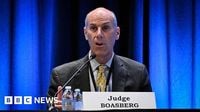On April 16, 2025, U.S. District Judge James Boasberg ruled that there is "probable cause" to hold officials from former President Donald Trump's administration in criminal contempt for violating court orders intended to halt the deportation of alleged Venezuelan gang members. This decision is part of an ongoing legal battle over the administration's use of the 1798 Alien Enemies Act to carry out mass deportations, a law that has historically been applied during wartime.
Judge Boasberg's ruling stems from a mid-March order that prohibited the deportation of migrants under this law. Despite this, the government proceeded to send three planes carrying over 200 Venezuelans to a prison in El Salvador, igniting a firestorm of political and legal backlash. In his sharply worded opinion, Boasberg stated, "The Court ultimately determines that the Government’s actions on that day demonstrate a willful disregard for its Order, sufficient for the Court to conclude that probable cause exists to find the Government in criminal contempt." This ruling signals a significant escalation in the ongoing tensions between the Trump administration and the judiciary.
Boasberg emphasized that the Justice Department had been granted ample opportunity to explain its actions but found their responses to be unsatisfactory. The judge has yet to determine the potential punishment or next steps, allowing the Justice Department until April 23 to respond before deciding how to proceed. If the administration fails to comply, Boasberg indicated he might seek to identify individual officials who ignored his order, potentially leading to prosecutions.
The deportations were part of Trump's broader strategy to combat what he characterized as threats from transnational gangs, particularly the Venezuelan group Tren de Aragua, which he labeled as foreign terrorist organizations. However, lawyers representing the deported individuals argue that many of their clients were not gang members and were targeted based on superficial characteristics, such as tattoos.
In a related development, the Supreme Court recently ruled that the plaintiffs in the Venezuelan migrants' case had filed their lawsuit in the wrong venue, complicating the central legal issues and removing them from Boasberg's jurisdiction. Despite this ruling, Boasberg maintained that it did not absolve the Trump administration from adhering to his orders while they were still valid.
White House Communications Director Steven Cheung announced that the administration plans to contest Boasberg's decision, stating, "We plan to seek immediate appellate relief." He emphasized that the President is committed to ensuring that "terrorists and criminal illegal migrants are no longer a threat to Americans and their communities across the country." This statement reflects the administration's determination to push back against judicial constraints on its immigration policies.
As the legal proceedings unfold, the Trump administration's actions have drawn criticism from various quarters. Skye Perryman, president and CEO of Democracy Forward, co-counsel in the case, remarked that Boasberg's decision "affirms what we have long known: the government’s conduct in this case is unlawful and a threat to people and our constitution." Lee Gelernt, the American Civil Liberties Union’s lead counsel in the case, echoed this sentiment, highlighting Boasberg's focus on the return of individuals sent to El Salvador without due process.
Judge Boasberg's ruling is notable not only for its implications for the Trump administration but also for its historical context. The Alien Enemies Act, which has been invoked rarely since its inception, was last used during significant conflicts such as World War II. Critics of the administration's approach argue that it echoes past injustices, particularly the internment of Japanese Americans during the war.
In addition to the contempt proceedings, the administration is facing scrutiny over the deportation of Kilmar Abrego Garcia, a Maryland resident who was sent to El Salvador due to what officials termed an "administrative error." A judge has ordered the Trump administration to facilitate his return, a directive upheld by the Supreme Court, but the administration has resisted compliance, asserting that the court lacked authority over such matters.
As tensions mount, Boasberg has made it clear that he intends to get to the bottom of the administration's actions. At a recent court hearing, he expressed skepticism about the government's claims of compliance and suggested that officials may have acted in bad faith, rushing to deport individuals before his orders could take effect. "Who made the decision either not to tell the pilots anything or to tell them to keep going?" he pressed during a heated exchange with a Justice Department lawyer.
Boasberg's ruling marks a critical moment in the ongoing struggle between executive power and judicial oversight. As the administration continues to grapple with legal challenges and public scrutiny, the outcome of this case could have far-reaching implications for immigration policy and the limits of presidential authority.
The legal landscape surrounding immigration enforcement remains fraught with tension as the Trump administration navigates a series of setbacks in the courts. As Boasberg prepares to launch contempt proceedings, the stakes are high, not just for the individuals affected by these deportations, but for the broader principles of justice and accountability that underpin the American legal system.





